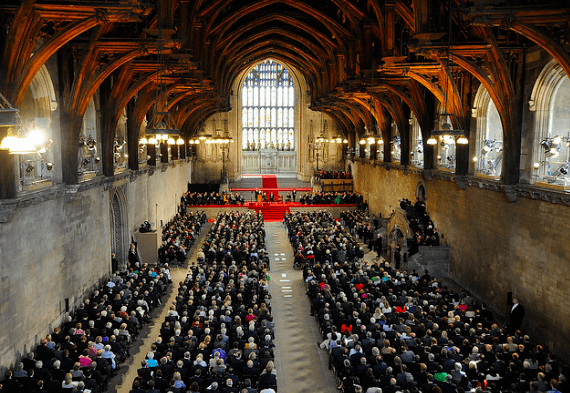
In his first address to the British Parliament, King Charles III paid tribute to his late mother, received condolences from representatives of the Houses of Commons and Lords, and praised Parliament as a “living and breathing instrument of our democracy.”
“We gather today in remembrance of the remarkable span of the Queen’s dedicated service to her nations and peoples. While very young, her late Majesty pledged herself to serve her country and her people and to maintain the precious principles of constitutional government which lie at the heart of our nation,” said the king.
“This vow she kept with unsurpassed devotion,” he added, “she set an example of selfless duty which, with God’s help and your counsels, I am resolved faithfully to follow.”
In return, John McFall, speaker of the House of Lords, referred to the Queen as “both a leader to, and a servant of, her people,” while praising her “joyous, unstinting, and reassuring presence across the years.” The speaker of the House of Commons, Lindsay Hoyle, called the Queen’s death “a loss that was felt around the world,” adding that “our late queen was here to mark the historic moments, such as the 50th anniversary of the Second World War, a war in which she herself served in the armed forces.”
Acknowledging the halls of Westminster, in which the ceremony took place, the king responded by stressing that he “cannot help but feel the weight of history which surrounds us, and which reminds us of the vital parliamentary traditions to which members of both houses dedicate themselves with such personal commitment for the betterment of us all.” Charles quoted from Shakespeare’s Henry VIII when referring to the late queen as “a pattern to all princes living:” borrowing the lines spoken by the archbishop Cranmer at Elizabeth I’s christening, prophetic of the unimaginable greatness her reign would bring to England. The king’s address ended with the audience rising and singing the national anthem.
The coming days will see a number of further ceremonial appearances of the new king; the next in line is a procession of the queen’s coffin to St. Giles’ Cathedral in Edinburgh, where the public will be able to pay their respects. This will be followed by meetings with Scotland’s First Minister Nicola Sturgeon, the Scottish Parliament, and visits to Wales and Northern Ireland.
